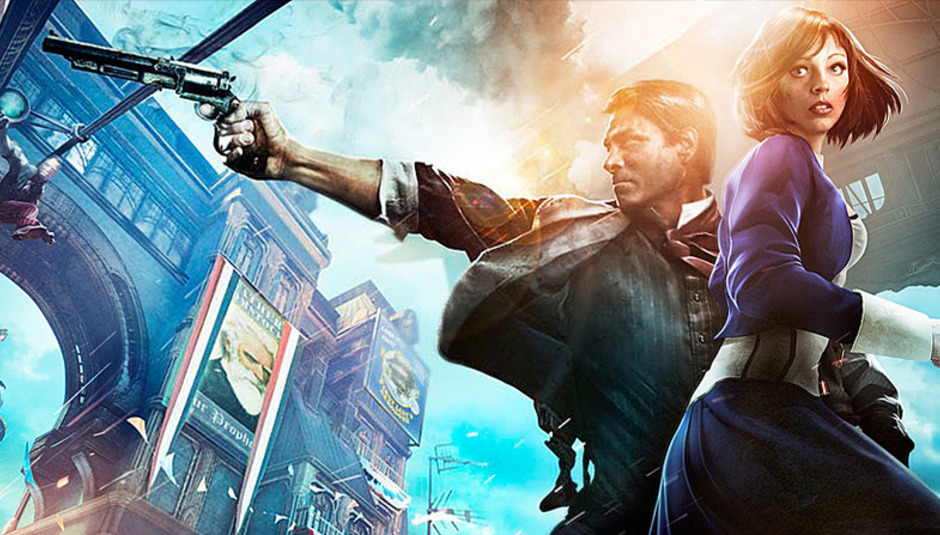Whatever your opinion(s) on the recordings of Scroobius Pip and his production pal dan le sac, the pertinent point of their breakthrough hit, ‘Thou Shalt Always Kill’, has resonated throughout music since its 2007 release. As individuals of the critical elite continue to lose tested perspective as iconic artists do stuff in the era of Bieber, Brown and Bumfords, it is worth remembering: The Rolling Stones, just a band.
And not a particularly important one in the 21st century, either – but that’s subjectivity talking, whereas in the language of pounds and pence their booking to headline this year’s Glastonbury Festival makes complete sense. Pip’s sentiment stands as one that transcends the industry it was penned to pointedly address – transfer it to the world of videogames, and it’s palpably apparent that many triple-A titles are every bit as groundbreaking as the rattling sack of bones passing for Mick Jagger since Freejack. Grand Theft Auto V will, most likely, be just a game. The Last of Us: just a game. Sim City: only just a game.
BioShock Infinite is not just a game.
Except, it is. Its mechanics are relatively rote – by which I mean that the run there, shoot that, collect this elements that have served the FPS genre since its very inception are present and correct. Enemy types conform to established standards (some fall down quickly, some are ammo sponges). The controls are laid out with familiarity in mind: if you played either of the preceding BioShock games (which you should have, especially 2007's first, which Infinite is very much the 'spiritual' sequel to), they’ll be second nature in moments; if you’ve any FPS experience whatsoever, they’re intuitive enough to have clicked within the first few skirmishes. Which won’t happen straight away. This is a game you’ll want to be patient with. It doesn’t demand that you peek into every corner you can; but to press ahead with only auto-save notices to chart your progress is to miss the beauty of Infinite.
Which leads us away from the gameplay fundamentals – control, combat, levelling up and cooling down – and into the area that BioShock creator Ken Levine has emphasised since beginning his career: narrative. And that’s not just the story, but how it’s told: both in terms of the delivery, the way in which the journey of the protagonist, Booker DeWitt, is explained through events both seemingly within and absolutely beyond his control; and the manner in which it’s experienced. Infinite does not pull control away from the player. First-person isn’t shifted to third to suit the framing of a dramatic scene; and nor do cut scenes intervene to shift the story onwards. Your eyes are Booker’s. What he sees, so do you; and your relationships are his. Hold onto that last point.
Artificial intelligence. When it works in games, it’s accepted – it’s supposed to work, so why should that be remarkable? And when it doesn’t – Aliens: Colonial Marines leaps straight to mind, but examples of poor AI are too numerous to condense into a meaningful summary – it’s highlighted as a serious issue. Bad AI can break a game. Good AI rarely makes a game. Great AI… like hen’s teeth.
For the majority of Infinite, Booker is joined – assisted, directed, amused and infuriated – by Elizabeth, a character of immediate intrigue and, ultimately, absolute narrative importance. She is every Little Sister rolled into one: a projection of the ‘main’ character’s feelings and a mirror for them. She looks a little like one of said Sisters, too, and somewhat akin to BioShock 2's Eleanor Lamb (she's even referred to as The Lamb - surely not a coincidence). She’s enigmatic, socially awkward, exuberant and, just occasionally, terrifying. She is phenomenally powerful, able to step from one place in time to a completely different one; or the same one, skewed by a set of alternative decisions, a reality both just like and entirely alien to what's been left behind. Before you meet her, a snippet of conversation from the future – or perhaps it’s the past? – encapsulates her importance. “Booker, are you afraid of God?” she asks. “No,” comes our (mostly faceless) lead's reply. “But I’m afraid of you.”
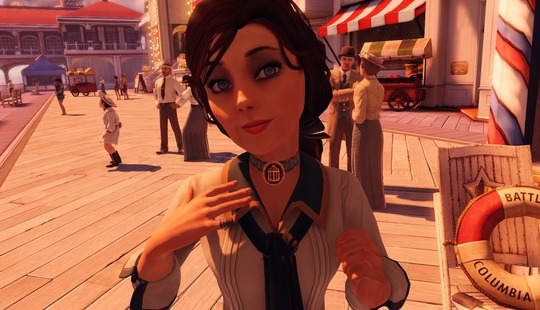 This is Elizabeth. That thimble on her pinkie, it's important, later...
This is Elizabeth. That thimble on her pinkie, it's important, later...
He’s not alone. When I meet Levine in a central London hotel, in the middle of pre-release promotional activity, he’s quick to comment on just how huge a risk Infinite’s developers, Irrational Games, took on Elizabeth. As anyone who’s played Infinite for any length of time will know, her presence becomes a strangely comforting one, her actions not bound by pre-scripted events. There is a real sense of attachment – which, as those who’ve finished the game will know, is very cleverly manifested so that the eventual pay-off is all the more… Wait, is this a spoiler? I’ll stop there. If you’re keen to know about Infinite’s ending, try Google: there’s only loads of essays, articles and videos out there offering explanations.
All you need to know is that Elizabeth is probably the greatest AI character of this hardware generation. Which, basically, makes her the most affecting NPC in videogames history. When she's not around, it's like being without a lover, a sister or a daughter who, before, was always there, your own shadow with a soul to call their own. She is an amazing creation. (Apart from that one time she got stuck in the scenery, only to pop up beside me when I accessed the next 'hub'... Hell, nobody's perfect.)
“We had a team at Irrational that we called ‘Liz Squad’,” remembers Levine. “A very multi-disciplinary group of people. A lot of work went into ‘telling’ Elizabeth where she should go, or what she should do – but her actions are almost entirely opportunistic. And her actions are highly attached to a set of heuristics – reactions are based on what she’s just done, or what mood she happens to be in. If she’s just been in combat, she’s going to be acting differently in that moment to if she’d not been. There’s a very complex set of levers working her. And we knew that if we got Elizabeth right, then we could get the game right.”
Elizabeth’s story and Booker’s are chapters in a longer, wider, perhaps everlasting one. The ‘infinite’ of Infinite is validated by its end – although it’s as apt around its beginning too, albeit through a different interpretation. Where BioShock and its sequel were set in the underwater city of Rapture – a place where art and science could evolve free of the red tape of governmental hierarchies – Infinite takes to the skies. Before, you could see as far as the ocean’s murkiness permitted; up here, in the floating seceded former-US state of Columbia, you can see forever.
From a place hidden away, concealed by and built within the planet’s own lifeblood; to a setting proudly pronouncing its superiority over terra-firma territories, albeit at the risk of seeing a citizen or some trip and fall some several thousand feet to a gruesome end. It’s quite the leap, environmentally. But just as Rapture was as important a character to BioShock as Andrew Ryan, Dr Tenunbaum or Frank Fontaine, so Columbia is much more than just a set of locked doors and side-quest-spawning alleyways. It, too, tells part of Infinite’s story.
“For BioShock, because it’s so narrative-orientated, any space that doesn’t tell a story is not the right space for us,” says Levine. “We begin with a lot of mistakes – I wish I could tell you that there was some sort of magic to it, but it’s a case of talented people being allowed to make mistakes and then trying again. And you keep trying.
“The most important things are: what am I seeing here, what is the audience seeing here, and what is it telling me? And if it’s not telling you anything, then why is it here? You have to be ruthless, because it’s very easy building space, and for most FPS games space is just a dressed-up combat environment. But the world around us, around all of us, tells a lot of stories, and we want these games to reflect that.
“You learn a lot in life from just looking around – and when you’re dealing with big ideologies, as we do in the story of BioShock Infinite, these big ideologies tend to project onto the environment. It’s like North Korea – you step into any home there, and you’ll find a picture of the Great Leader. In every living room, there he is.”
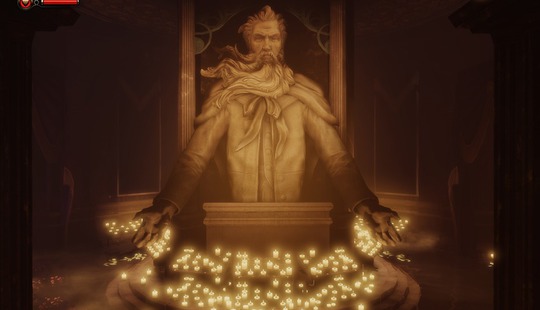 This Comstock fellow, then. Frequently stoned.
This Comstock fellow, then. Frequently stoned.
All over Columbia, there he is: Zachary Hale Comstock. Look up the meaning of that first name: “the Lord remembers”. Hale, meanwhile, means hero. Pope from 741 to 752, Zachary was one of the first to assume the papacy and not change their name. These are little facts, tiny seeds, but play Infinite and you can see how they probably factored into Levine’s thought processes when creating the character that is about as antagonistic as any of this game’s NPCs become. The Lord remembers. The Lord gives. And the Lord takes away.
There’s a rebel leader in the mix, too, by the name of Daisy Fitzroy. She stands out in Infinite’s imagining of a 1920 above the clouds: black, the very opposite of subservient, and doing what she can to shake up Columbian society. Which is, loosely: privileged white people worshiping the Founding Fathers make all the money (and give half of it to Comstock, nice); the poor of any creed or colour mop floors, wash dishes, and just occasionally get caught slacking off with a cigarette in hand. Probably not the Minor Victory brand, which are advertised in game as being “especially for kids”.
Ultimately Fitzroy isn’t as three-dimensional as Comstock, or Elizabeth, or Booker, or the scientifically minded Lutece ‘siblings’, whose roles become increasingly prominent. She fades away from storyline importance, an ally-turned-enemy easily overcome as she gleefully embraces bloodlust. (On topic: BioShock Infinite is not a tough game, on its standard difficulty setting. It offers a fair challenge following a generous gradient, its makers keen that you follow the story without being bogged down by replaying areas. But if you do want to feel that every bullet matters, set it to hard.)
But towering over all of these human players is Columbia itself: a living playground of rising and falling tower blocks, detaching and reconnecting walkways, and Sky-Lines that ferry freight from A to B, and become invaluable escape routes for Booker when under siege. If its inhabitants begin to look like recycled models, which they do, Irrational are a step ahead of you: come the end, you realise why the same faces appear several times. You appreciate the power of imagination influencing Infinite, compositionally and developmentally. "Peas and porridge": a small, easily overlooked remark, actually of particular pertinence.
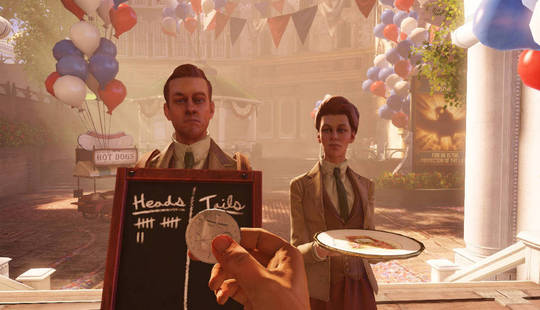 The Lutece twins: just me with an old Spice Girls song in his head?
The Lutece twins: just me with an old Spice Girls song in his head?
With its wide-open areas allowing varied approaches to attack and defence, Columbia is more than different to Rapture – it’s dimensions away. But as Levine recalls, Rapture itself was still a construct of fantasy over physics.
“Our goal has always been to embrace whatever environment you take on, to the fullest extreme. When we were working on Rapture, there were debates regarding how big the windows should be. I always said that the windows should be huge – because if you’re in that room, but you don’t realise that you’re at the bottom of the ocean, then you’re not in Rapture, you know? My mantra was: there’s always an ocean view. I don’t think we managed that 100%, but that was the goal.
“So anyway, on the preliminary designs for Rapture, there were all of these tiny, pinhole windows. I appreciate the technical side, that they’d have to be that small – but I just didn’t care. Suspension of disbelief is a wonderful and weird thing. If you know anything about physics, and liquids, and pressures, then that city, Rapture, just isn’t going to work for you. But on the other hand, that prototype of it? It was just terrible.
“To take away the location of Rapture would have reduced its importance as a space. It could have been all steel, pipes everywhere… and not like Rapture at all. If it really was a place on the bottom of the ocean, of course it’d look a lot different – but that’s not fun! And besides, a model that worked in the real world could never express the ideologies of Rapture, those things that can’t be presented in words. And that’s why Columbia looks the way it does, too. It is the city on the hill. Rapture was hiding away from the world, but Columbia is up there, saying, look at us.”
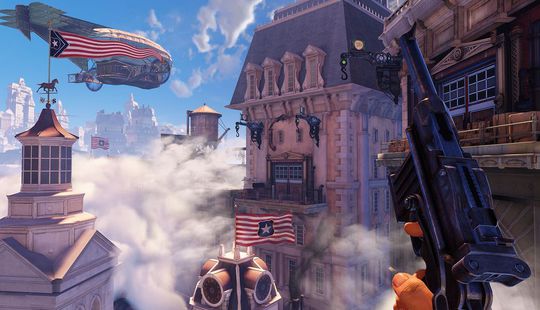 Going up to the city in the sky... and killing a load of twisted zealots.
Going up to the city in the sky... and killing a load of twisted zealots.
And look at it you should – the BioShock games have always hidden their secrets in open sight, it’s just a question of finding the right path. And Infinite’s story is made all the more enjoyable by viewing the Kinetoscopes littering the place (right up to the final scenes), listening to Voxophones, exploring shops and eavesdropping on conversations between citizens, be they from the wrong side or the Right side of the Sky-Lines. Through its environmental assets, its generally excellent voice-acting, its motion-capture and even its music – listen for ‘antiquated’ interpretations of ‘Shiny Happy People’, ‘Tainted Love’ and (one that you definitely won’t miss) ‘God Only Knows’ – Infinite really pays those really paying attention back. Drown out the exposition with explosives and you’ll not be getting half of the value from what’s already being spoken about as a game of the year. Even though it’s not just a game.
“We designed Infinite so that it can be played by those who like to rush ahead and shoot things,” says Levine. “But it’s also made for those who love to explore every nook and cranny. I will say that it’s painful sometimes to watch people skip past all the stuff we’ve put in there, but the trade-off is worth it. I’ll trade players missing five things for discovering just one, by themselves, without prompts or cut-scenes playing in front of your face. It means more work for us, but I think it makes for a better experience as a gamer.
“And, really, gamers come as all kinds today. We make this type of game, and someone else makes a different one, and I think that’s great. I really don’t have any patience for developers who think that their way of making games is the only way. That’s a real sign of immaturity. There are so many ways to make an exciting experience – and some days you want steak, while on others you want chicken. And that’s a good thing, not a bad thing. The more people are pushing on all fronts, the more innovative things we’ll find. The games industry is very good at making giant first-person, fight-the-terrorists shooters – but, then, if everyone was focused on making tiny indie games, it’d make for a lesser experience.
“But looking back, I’m grateful that Take-Two took a leap of faith on the first BioShock. Someone had to take that leap, for us to be where we are today. And, frankly, if someone had put a gun to my head back then and asked if BioShock would make money, I’d have said no, probably not.”
It made some money: BioShock has sold millions worldwide. Infinite went straight to the summit of the UK sales chart after a week on sale, shifting over 9,000 more copies in that period of time than the similarly anticipated BioShock 2. Unlike its direct series predecessor though, Infinite establishes such a hold on the player that, come the credits, all you can do is sit in silence, in awe of what’s just unfolded. Not because pressing the left trigger to fire a Plasmi… sorry, a Vigor is so innovative, but because this game embraces its medium like few titles before it, to tell an engrossing, moving story that is of paramount importance to the gameplay but also entirely appreciable removed from it. (Definite spoilers the other side of that link.)
Now let’s see what The Rolling Stones manage in Somerset this summer, being just a band.
BioShock Infinite is out now (d'uh) and was played on Xbox 360 for the purposes of this article. Having also played it on PC, I'd have to say get that one if you've the choice, as it makes the already amazing visuals even more outstanding.
DiScuss: Other examples of brilliant storytelling via the videogame medium… go!

